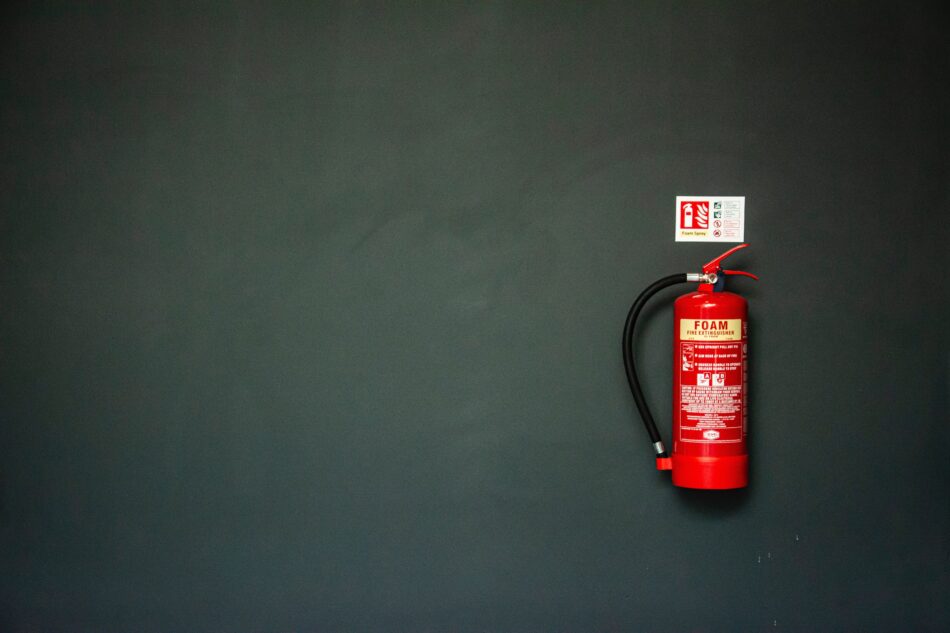Prepare Your Business for New Food Waste Legislation in the UK
From 31 March 2025, most UK businesses must arrange separate food waste collections. Learn and prepare for the new food waste legislation in the UK.

Disposing of fire extinguishers once they’re used or expired should be done in a safe and environmentally friendly way. Alongside fire alarms, fire extinguishers are essential to maintain the safety of homes and workplaces in the UK. Hopefully, you’ll never have to use one, but if you do or it gets too old correct disposal of fire extinguishers is required.
It’s important you know how to properly dispose of the different types of fire extinguishers in your home or business. Discover how to dispose of a fire extinguisher and learn all about recycling fire extinguishers with our answers to some of your most common questions.
An empty or out of date fire extinguisher classes as hazardous waste. This is because they contain pressurised chemicals, whichever type of fire extinguisher you need to dispose of. With old fire extinguishers that haven’t been used, it’s important you empty them first before arranging disposal.
Recycling fire extinguishers is one of the best ways to dispose of them. However, as they class as a type of hazardous waste you can’t get rid of them alongside your other recyclables. The Environmental Protection Agency regulates the disposal of hazardous waste and restricts disposal sites to certified professionals.
The most effective way to get rid of an old or used fire extinguisher is to take it to your local recycling centre if they offer a hazardous waste disposal service. For businesses, you can arrange collection of your old fire extinguishers by licensed waste carriers such as Business Waste. We’ll transport them to a relevant recycling facility for appropriate disposal.
Alternatives like foam or carbon dioxide fire extinguishers don’t pose these issues and can be disposed of through normal channels, like your local waste management facility.
When you recycle fire extinguishers, they’ll go to a relevant recycling centre for specialist disposal. If the fire extinguisher is still charged, then the chemicals will be safely removed and possibly captured for reuse. Then the canister is stripped, and the individual parts sent for metal recycling.
If disposed of improperly, fire extinguishers can leak hazardous chemicals into our water supply. A major problem is also illegal dumping. When left unattended, they can easily be picked up and taken to illegal dump sites or otherwise discarded carelessly. This can cause damage to property and poses serious health risks to humans, animals, plants, and ecosystems.
There are three main places you can go to dispose of a fire extinguisher from your home for free:
British Captain George William Manby invented the first portable fire extinguisher in 1818. He developed a hand-pumped, powder-based extinguisher that he mounted on a cart to use at sea. It wasn’t until 1850 when ‘in case of fire break glass’ extinguishers were introduced.
Then it took another 60 years before fire extinguishers were made available to all people, not just professionals. The first dry chemical extinguisher was created in 1910.
Fire extinguishers are made of a hand-held cylindrical pressure vessel containing an agent – usually water or dry chemical powder – with an operating mechanism to discharge it.
The pressure vessel and valve are made of metal. Attached to the vessel is a rubber hose through which the fire-fighting agent is directed towards the fire. Inside the vessel are the agent and the propellant (a gas that forces the agent out of the vessel).
Depending on which agent is used, there are different propellants:
Yes, a fire extinguisher can expire normally after ten or 20 years. How long a fire extinguisher lasts depends on the type, manufacturer, and how well it’s maintained. You should be able to check the manufacturing date of a fire extinguisher on the body or service label to get an idea of when it might need replacing.
For UK businesses, the Regulatory Reform (Fire Safety) Order 2005 outlines the legal requirements for having fire extinguishers in commercial buildings. Using fire extinguishers is the safest option in most cases, to both ensure your company operates within the law and best protects your employees and customers.
Fire extinguishers are also a safe choice in the home, but there are a few alternatives. If you want to avoid using fire extinguishers, you can try smothering small fires by covering them with a fire blanket or other object. If they’re electrical in nature, turn off all power to your home immediately.
A wet cloth can be effective when it comes to certain kitchen fires, and a pot lid can stop a grease fire in its tracks. If you’re wondering what you can do if you encounter an electrical fire with no nearby extinguisher, try to find something non-flammable to throw over it until help arrives.
A few key facts about fire extinguishers are that:
Find out more about other rubbish streams.
Get a fast FREE quote for your waste
From 31 March 2025, most UK businesses must arrange separate food waste collections. Learn and prepare for the new food waste legislation in the UK.
The study participants included business owners and company employees, revealing unexpected findings about corporate environmental practices.